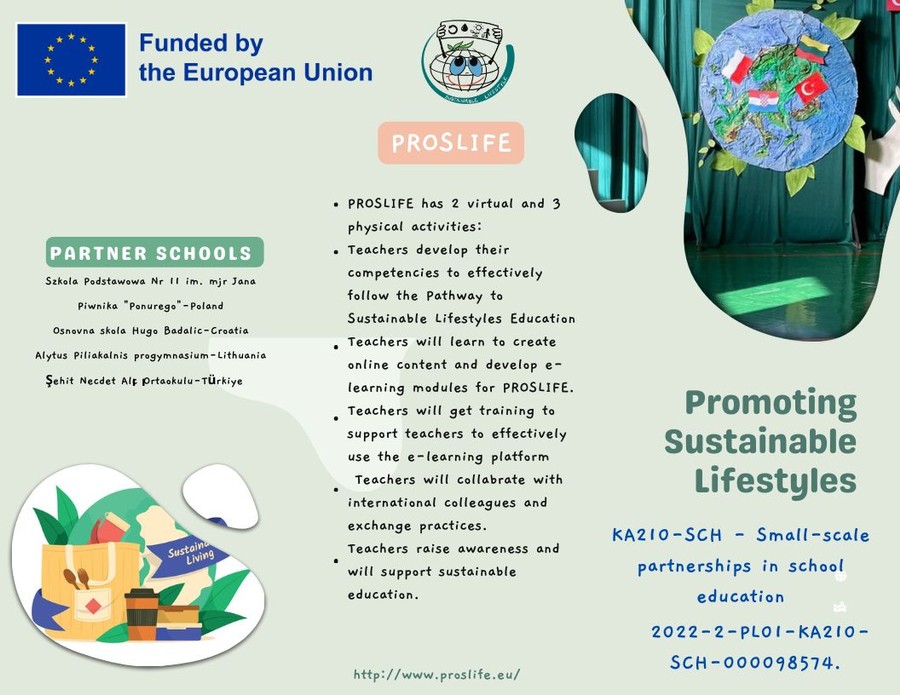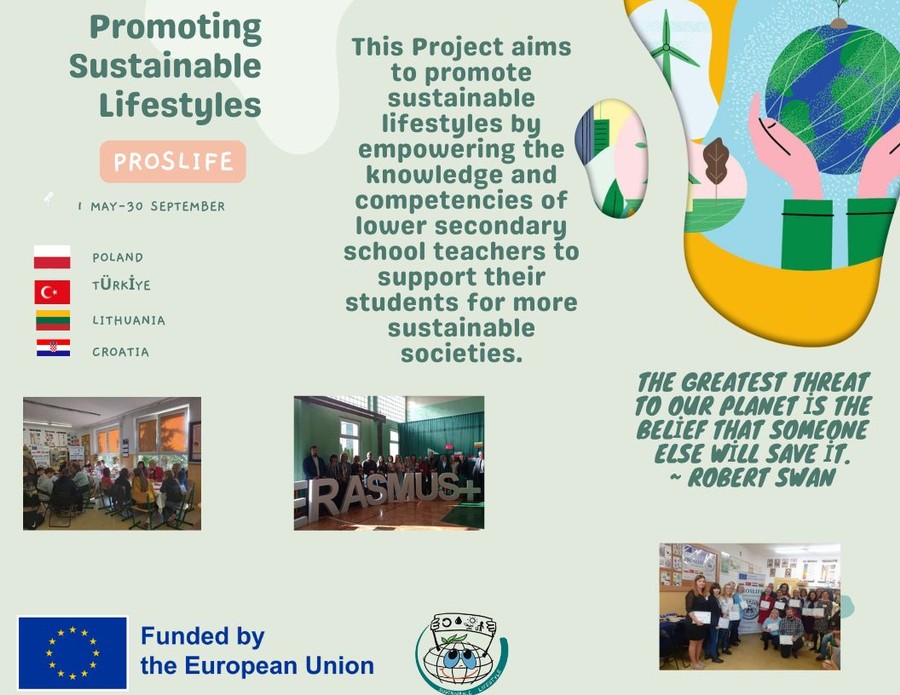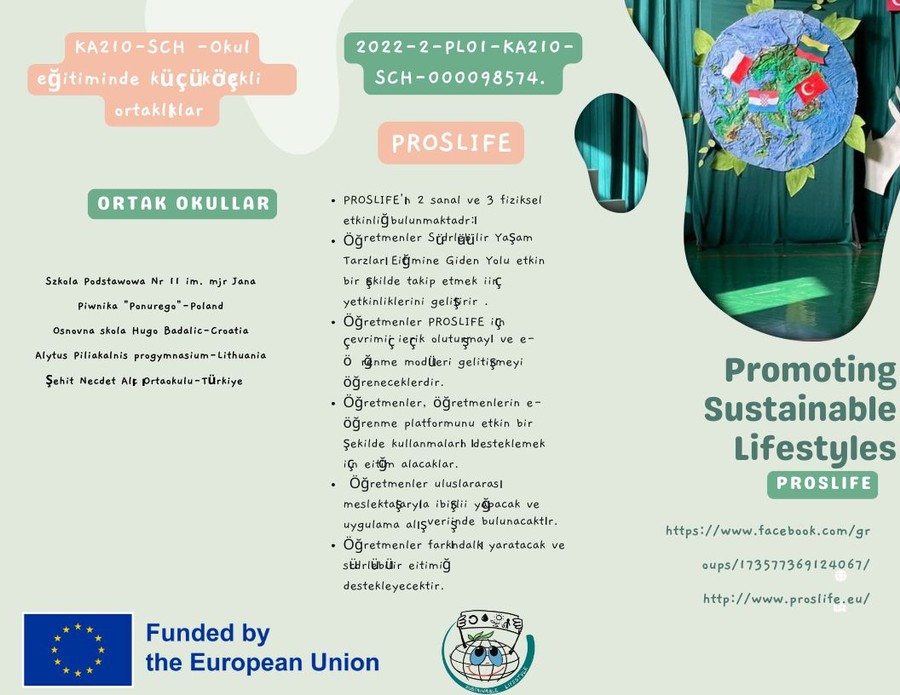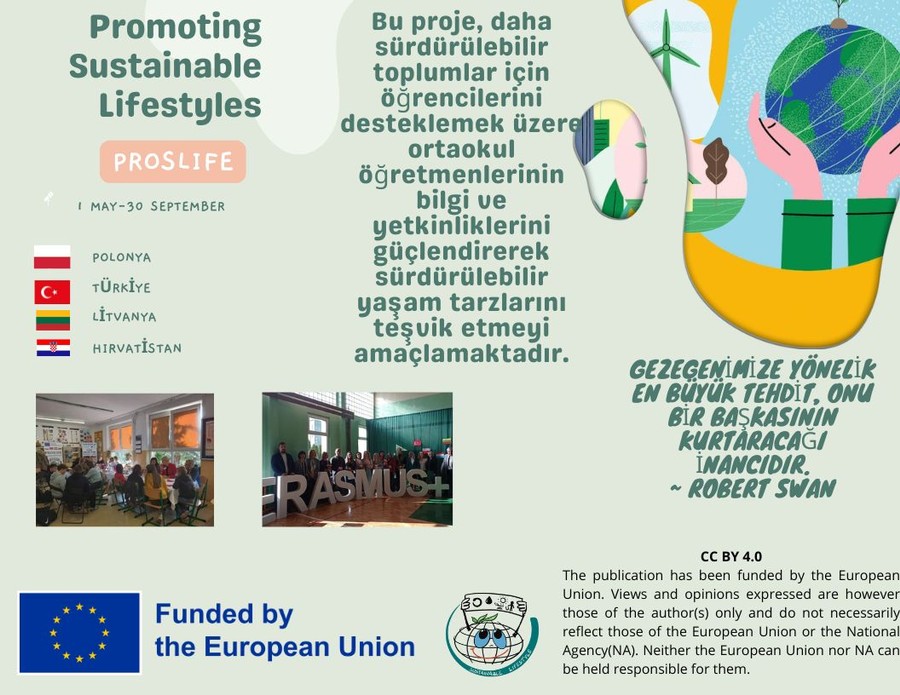Q1 2024 - proslife
Menu główne:
Blog
Promoting Sustainable Lifestyles
29.03.2024
Another notable workshop held during our visit to Croatia was centered around the zero waste lifestyle. The lesson plan for this workshop includes comprehensive activities designed to educate students about reducing waste, recycling, and adopting sustainable practices in their daily lives. By engaging in these hands-on sessions, students learned practical ways to minimize their environmental footprint. We encourage everyone to take a look at the detailed lesson plan to gain insights into the creative and impactful methods we used to promote a zero waste mindset.
Promoting Sustainable Lifestyles
28.03.2024
One of the key tasks during our visits to Poland and Croatia was developing lesson plans based on the workshops conducted. The workshops in Poland focused on natural cosmetics, offering a hands-on approach to creating environmentally friendly beauty products. We invite you to review the detailed workshop plans and discover the innovative activities we have designed.
Promoting Sustainable Lifestyles
20.03.2024
During the mobility at the partner school in Croatia, teachers discussed the developed Modules Content for the upcoming e-learning platform. Technical details regarding the platform's development were finalized, and an analysis of the module content was presented. The final version of the module content is showcased in the slides below.
Promoting Sustainable Lifestyles
19.03.2024
During the Mobility in Croatia, one of the activities we engaged in was interviewing students from the host school. We explored their habits related to commuting to school and traveling within the city and country. It was impressive to see how conscientious the students were about the importance of sustainable transportation.
Promoting Sustainable Lifestyles
18.03.2024
On 4-9 March, representatives of partner schools took part in the SUSTAINABLE LIFESTYLE STARTS WITH TEACHERS mobility. This event took place in the picturesque town of Slavonski Brod in Croatia, where all the partners involved in the project met. In addition, the participants also included teachers from partner schools from Turkey, Polish and Lithuania.
The project we are working on aims to raise the awareness of primary school teachers about sustainable development. We are creating an innovative training platform that will provide access to a wealth of educational material related to the topic of sustainable development. As part of the project, we have already developed a pedagogical model of the platform and identified training modules and submodules. Now we have the next stage ahead of us - the development of substantive content that will enrich our platform.
It wasn't just the work on the project that filled our days. We had the opportunity to participate in the welcoming ceremony at the host school. It was a great opportunity to learn about the cultural customs of each partner country, interact with students and participate in a seminar on sustainable transport and environmental workshops. In addition to school work, we also visited picturesque cities such as Zagreb, Osijek and Dakovo. We also couldn't resist a walk to Bosnia and Herzegovina, which is located on the other side of the river flowing through Slavonski Brod. On the last day of our stay, we had the honour to visit the City Hall, where we were solemnly received by the Deputy Mayor.
All the valuable experiences we gained during this unique trip will certainly be reflected in our daily work, contributing to even better preparation of our students for life in the international community.
Mobility in Croatia Newsletter prepared by our Croatian partners. Unforgettable moments and fruitful time spent together in Slavonski Brod.






During the Mobility in Croatia we participated in Seminar on "Sustainable Transportation" prepared and led by the Croatian coordinator
The Virtual Activity Presentation prepared by our Turkish partner
The Project's Brochure prepared by our Turkish partner.




Project’s impact
The project's impact has been notable across various stakeholders, including participants, participating organizations and target groups:
Participants:
- Teachers involved in the project have gained valuable knowledge and skills related to sustainable lifestyles education through training sessions, workshops, and collaborative activities.
- They have also been actively engaged in the development of the e-learning platform, contributing their expertise and insights to ensure its effectiveness and relevance.
Participating Organizations:
- Partner schools and institutions have strengthened their collaboration and exchange of best practices in promoting sustainable lifestyles.
- The project has provided opportunities for networking, capacity-building, and professional development among participating organizations, fostering a sense of shared purpose and collaboration.
Target Groups (Lower Secondary School Students):
- While the direct impact on target groups may not yet be fully realized due to the ongoing development of the e-learning platform, the project lays the groundwork for future engagement and education on sustainable lifestyles.
- Students stand to benefit from the enhanced teaching materials and resources that will be available through the e-learning platform, empowering them to adopt and promote sustainable behaviors.
Relevant Stakeholders:
- Local communities and educational authorities have shown interest and support for the project's objectives and activities.
- By promoting sustainable lifestyles education, the project contributes to broader societal goals related to environmental conservation, social equity, and economic sustainability.
As the project progresses and the e-learning platform is launched, its impact is expected to further amplify, reaching a wider audience and contributing to lasting changes in attitudes and behaviors towards sustainability.
The dissemination of project results has been a key focus of our efforts, both within and beyond our partnership. We have targeted specific audiences at the local, regional, national, EU, and international levels to maximize the reach and impact of our project. Here's an overview of our dissemination activities:
Local Audience:
- Within our local community, we have disseminated project results to school administrators, teachers, students, and parents.
- By engaging these stakeholders, we aim to raise awareness and promote the integration of sustainable lifestyles education into the school curriculum and daily practices.
Wider Audience:
- At the regional, national and international level, we have shared project outcomes and resources with other schools, educational institutions, and relevant stakeholders.
- This dissemination strategy helps to foster collaboration, exchange of best practices, and collective action towards sustainability within our region.
We document the course of the project using the following Internet sources:
Project’s website: www.proslife.eu
Poject’s Facebook Page: Promoting Sustainable Lifestyles
We made a film from the interviews with students: https://youtu.be/2ZzTMEw4V1c
Overall, our targeted dissemination approach ensures that project results are effectively communicated to relevant stakeholders at various levels, maximizing the potential for impact and sustainability of our efforts in promoting sustainable lifestyles.
Activity 2 DEVELOPING THE TEACHER TRAINING CONTENT-(TTC) FOR PROSLIFE – summary
During this virtual activity, the project team focused on developing the training content for PROSLIFE tailored to lower secondary school teachers. Leading this initiative was our Turkish partner, whose team boasts experienced and qualified individuals in curriculum design. They took charge of coordinating tasks, monitoring activities, overseeing deliverables, and conducting evaluations throughout the process.
Between Months 3 to 8 (M3-M8), the partners collaboratively executed the following tasks:
Overview of Existing Practices and Definition of Pedagogical Model:
- The team conducted a thorough examination of current teaching practices in Education for Sustainable Development (ESD) and Sustainable Lifestyles.
- They carefully selected and evaluated exemplary practices to inform the development of the PROSLIFE pedagogical model, ensuring it aligns with best practices and educational standards.
Design and Implementation of Needs Analysis Questionnaire:
- A needs analysis questionnaire was meticulously designed to gather valuable insights from teachers in each partner country.
- The questionnaire was translated into local languages and distributed to 15 teachers in each country via Google Forms.
- Subsequently, the responses were meticulously analyzed, and a comprehensive report was developed to highlight key findings and recommendations.
Definition of Competencies, Learning Outcomes, and Modules:
- The team collaborated to define the competencies, learning outcomes, modules, submodules, and topics that would form the foundation of the Teacher Training Content (TTC) for PROSLIFE.
- Ensuring alignment with curriculum standards and educational objectives, this task aimed to create a structured and comprehensive training program for teachers.
By engaging in these tasks, the project team laid the groundwork for developing high-quality training content that will empower lower secondary school teachers to effectively integrate sustainable lifestyles education into their classrooms.
The tasks to be implemented in the upcoming phase of the project, include:
Development of Assessment Tool to Evaluate Module Content:
- The team will focus on creating an assessment tool designed to evaluate the content of the modules developed for the e-learning platform.
- This tool will be carefully crafted to assess the effectiveness of the educational materials in meeting learning objectives and promoting sustainable lifestyles.
Conducting Internal and External Evaluation of Module Content:
- Following the development of the assessment tool, the team will proceed to conduct both internal and external evaluations of the module content.
- Internal evaluation involves reviewing the content within the project consortium to ensure alignment with project goals and quality standards.
- External evaluation involves seeking feedback from external stakeholders such as educators, sustainability experts, and potentially students to gain diverse perspectives on the content.
Collaborative Development of Teacher Training Content (TTC) for PROSLIFE:
- Upon completion of the assessment and evaluation tasks, the project partners will collaboratively develop the Teacher Training Content (TTC) for PROSLIFE.
- This content will be designed to equip teachers with the knowledge, skills, and resources needed to effectively incorporate sustainable lifestyles education into their teaching practices.
- The TTC will be integrated into e-learning modules in the next virtual activity, marking a significant milestone in the project's progress towards promoting sustainable lifestyles.
These tasks represent critical steps in the project's trajectory, as they contribute to the refinement and enhancement of educational materials aimed at fostering sustainable behaviors and attitudes among students and educators alike.
Activity 1 THE PATHWAY TO SUSTAINABLE LIFESTYLES EDUCATION – summary
The tasks implemented in accordance with the project plan outlined in the application form are as follows:
The Kick-off Meeting (Month 1 - M1): We held an online kick-off meeting for half a day to initiate the PROSLIFE project. During the meeting we allowed partners to introduce themselves and discuss details of the upcoming physical activity.
The Physical Activity in Starachowice, Poland: We conducted a presentation on the Erasmus+ program and Small-scale partnerships. We signed Interior Agreements and discussed financial and administrative management, we reviewed the Gantt Chart, Project Work Plan, and Project Budget. We also formed management teams and agreed on the design of the project website. We received the PROSLIFE Dissemination Plan from the Lithuanian partner. We visited the hosting school to learn about their ESD and Sustainable Lifestyles Practices. We attended a seminar on 'Consumer Societies' led by the Polish partner. We conducted interviews and produced a video with students about their consumption habits. We participated in a workshop on 'Green Cosmetics'.
In a partner group we discussed activities, tasks, deadlines, and deliverables regarding the development of Educational Content for PROSLIFE. We also managed to engage in cultural interactions and field trips.
During one of the training days we exchanged best practices focusing on green, inclusive, and digital topics. We designed a Strategic Plan to enhance the sustainability, inclusivity, and digitalization of the project and concluded the mobility with a surprise activity organized by the hosting school.
These tasks were implemented as planned, contributing to the successful initiation and development of the PROSLIFE project. Each activity was carefully designed to advance the project's goals of promoting sustainable lifestyles through education and collaboration among partners.
The tasks to be implemented as part of launching the e-learning platform dedicated to sustainable lifestyles include:
Platform Development: we will collaborate with technical experts and instructional designers to develop the e-learning platform, ensuring user-friendly interface, accessibility, and compatibility with various devices and browsers. We are currently in a stage to create and organize content modules on sustainable lifestyles education, incorporating multimedia resources, interactive elements, and assessment tools.
Content Creation: We will develop educational materials, resources, and activities on sustainable living topics such as energy conservation, waste reduction, eco-friendly transportation, and ethical consumption. We will ensure alignment of content with curriculum standards, learning objectives, and pedagogical approaches.
Teacher Training: We will design and conduct training sessions for teachers on how to use the e-learning platform effectively in their classrooms and provide guidance on integrating sustainable lifestyles education into existing lesson plans and curriculum frameworks.
Testing and Feedback: We are planning to pilot test the e-learning platform with a select group of teachers and students to identify any technical issues, usability challenges, or content gaps. We will collect feedback from users through surveys, focus groups, and interviews to iteratively improve the platform based on their input.
By implementing these tasks, we aim to create a comprehensive and engaging e-learning platform that empowers teachers and students to explore, learn, and take action towards sustainable living practices.
Project’s newsletter February 2024
We are pleased to report that the project is progressing according to plan, with several significant achievements at this stage:
The meeting of project participants in Poland was a success. It provided an opportunity for fruitful discussions, knowledge sharing, and collaborative planning. Participants exchanged ideas and experiences, further strengthening the cohesion of the project consortium.
One of the key milestones achieved is the initiation of work on an e-learning platform dedicated to sustainable lifestyles. Teachers from participating schools are actively involved in the development process, contributing their expertise to ensure the platform effectively addresses the project's objectives. This platform will serve as a valuable resource for teachers, offering interactive modules, educational materials, and multimedia content on sustainability topics.
We conducted a set of surveys among the teachers concerning their expectations about the platform. We also interviewed students on the topics relevant to the sustainable practices. The pedagogical model of the platform was established and the modules and submodules were agreed.
Students are actively participating in project activities due to the implementation of eTwinning project. They are demonstrating enthusiasm in promoting sustainable lifestyles. They are eager to explore environmental issues, adopt eco-friendly practices, and advocate for positive change within their schools and communities.
The project's initial activities and objectives are being carried out effectively, with measurable progress in promoting awareness towards sustainability. From organizing events during the Activity in Poland and campaigns to implementing innovative educational initiatives, each step contributes to our overarching goal of fostering sustainable lifestyles.
The project is making significant strides towards its objectives, with collaboration among partners, dedication from teachers, and active involvement from students.
We organized online meeting to introduce project partners and discuss details of upcoming activities.
During the Physical Activity in Starachowice, Poland we gave a Presentation on Erasmus+ program and Small-scale partnerships. We signed the Interior Agreements and we took a discussion on financial and administrative management. We organized overview of the Gantt Chart, Project Work Plan, and Project Budget. We agreed on the formation of management teams and agreement on the design of the project website. We made a review of the PROSLIFE Dissemination Plan provided by the Lithuanian partner. We organized the exchange of best practices focusing on green, inclusive, and digital topics. We spent one working day designing a Strategic Plan to enhance the sustainability, inclusivity, and digitalization of the project.
The Virtual Activity for Teacher Training Content (TTC) Development (M3-M8) which is led by the Turkish partner, responsible for coordination, monitoring, and evaluation resulted in collaborative tasks which include:
- Overview of existing practices in teaching ESD and Sustainable Lifestyles, selection, and evaluation of good practices to define the PROSLIFE pedagogical model.
- Designing a needs analysis questionnaire, translating, implementing it to teachers, analyzing responses, and developing a report.
- Defining competencies, learning outcomes, modules, submodules, and topics for the TTC.
- Developing an assessment tool to evaluate the Modules Content.
- Conducting internal and external evaluation of the Modules Content.
At the end of these tasks, partners will collaboratively develop the Teacher Training Content (TTC) for PROSLIFE, to be integrated into e-learning modules in the next virtual activity. These activities align with the project's objective of promoting sustainable lifestyles through education and capacity-building among teachers.
The monitoring of the project is being carried out systematically to ensure that activities are progressing as planned and objectives are being met. Here's how the monitoring process is being conducted:
The project coordinator, typically the Polish school in this case, plays a central role in monitoring the overall progress of the project. They oversee the implementation of activities, track timelines, and ensure that all partners are fulfilling their responsibilities.
Partners engage in regular communication through various channels such as WhatsApp group, email, video conferences, and online collaboration platforms. This facilitates updates on task completion, challenges faced, and any necessary adjustments to the project plan.
Tools such as Gantt charts, project management software, and shared documents are utilized to track progress against timelines and milestones. These tools provide visibility into the status of tasks, deadlines, and dependencies, allowing for timely intervention if needed.
Partners are required to submit progress reports at specified intervals, typically following each major activity or milestone, both methodology and finances. These reports detail achievements, challenges encountered, and plans for upcoming activities.
Evaluation activities are integrated into the project to assess the effectiveness and impact of project activities. Feedback from participants, stakeholders, and beneficiaries is collected to identify areas of improvement and inform decision-making.
By employing a combination of coordination efforts, communication channels, monitoring tools, reporting mechanisms, evaluation activities, and quality assurance measures, the project consortium ensures that the PROSLIFE project progresses smoothly and achieves its goals of promoting sustainable lifestyles effectively.
The project partners have made significant contributions to the project, ensuring its successful implementation thus far. Here's how each partner has contributed:
Project Coordinator (Polish School):
- Led the organization of the meeting in Poland and facilitated discussions on project management and coordination.
- Provided guidance on administrative and financial matters
- Oversaw the development of the project website and ensured alignment with project objectives.
- Collaborated with partners in PROSLIFE Dissemination Plan.
Lithuanian Partner:
- Contributed to discussions on administrative and financial management.
- Provided valuable input into the PROSLIFE Dissemination Plan.
- Engaged in ongoing communication and collaboration with other partners.
Croatian Partner:
- Contributed to discussions on administrative and financial management
- Engaged in ongoing communication and collaboration with other partners.
- Provided valuable input into the exchange of good practices.
Turkish Partner:
- Took the lead in organizing and coordinating the virtual activity for developing the Teacher Training Content (TTC).
- Developed tasks, monitored activities, and evaluated progress related to the TTC development.
- Collaborated with partners to define competencies, learning outcomes, and modules for the TTC.
All Partners:
- Actively participated in discussions and decision-making processes during project meetings and virtual activities.
- Contributed expertise, insights, and resources to various aspects of the project, including curriculum design, educational content development, and dissemination strategies.
- Engaged in the implementation of tasks outlined in the project plan, ensuring timely completion and alignment with project objectives.
Overall, the distribution of tasks has been flexible and responsive to the evolving needs of the project, ensuring collaboration and progress towards promoting sustainable lifestyles.
While the core project consortium consists of formal partners actively engaged in the project, there are also other organizations and entities involved in various capacities to support our objectives. Here's a brief overview of their involvement:
Municipalities in partner countries play a crucial role in supporting the project by providing access to resources, facilities, and networks within their respective communities. They offer venues for project events (activity in Poland), assist in promoting project activities through local channels, and facilitate collaboration with local stakeholders and residents.
Environmental NGOs, educational institutions, and sustainability-focused organizations are valuable allies in advancing the project's goals. These organizations may contribute expertise, resources, and networks to support project activities such as awareness campaigns, educational initiatives, and community engagement.
Other schools and educational institutions, beyond the formal project partners, may participate in project activities as collaborators or beneficiaries. We share our experience within the local community so as other educational institutions may engage in knowledge exchange, joint activities, or adoption of project outcomes within their own educational programs to promote sustainable lifestyles among their students and staff.
We hope businesses and industry partners with a focus on sustainability may offer support through sponsorships or partnerships for project activities. They may also provide expertise on sustainable practices, offer access to sustainable products and serve as role models for adopting environmentally friendly practices.
Overall, the involvement of these organizations enriches the project's reach, impact, and sustainability by leveraging diverse expertise and networks within the community. Their support enhances the effectiveness of our efforts to promote sustainable lifestyles.
While the implementation of the project has largely proceeded smoothly, there have been some challenges encountered along the way. Here are some difficulties we've faced and how we've addressed them:
Developing an e-learning platform dedicated to sustainable lifestyles has posed technical challenges such as software compatibility issues, user interface design complexities, and content integration difficulties. To address these challenges, our team has collaborated closely with technical experts (Lithuanian team), instructional designers, and educators to identify solutions, prioritize features, and ensure usability and functionality.
Coordinating activities and communication across multiple partner organizations dispersed across different countries and time zones can be challenging. To overcome this challenge, we've established clear communication channels, designated focal points within each organization for project coordination, and scheduled regular virtual meetings to align on objectives, share updates, and address issues in a timely manner.
We've remained flexible and adaptable in our approach, regularly monitoring external developments, assessing their implications for the project, and proactively adjusting plans as needed to mitigate risks and ensure continuity of project implementation.
Another difficulty may arise from the cooperation with municipality, where accountants demand information taking a lot of time and effort, for example translating the whole application form into Polish language for their purpose.
Ensuring active engagement and participation of all project participants can be challenging due to varying levels of interest, motivation, and availability. We've implemented strategies to enhance engagement, such as organizing workshops, involving participants in decision-making processes and fostering a sense of ownership and commitment to project outcomes.